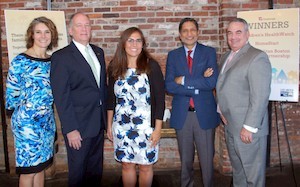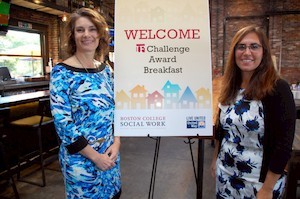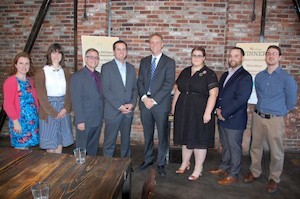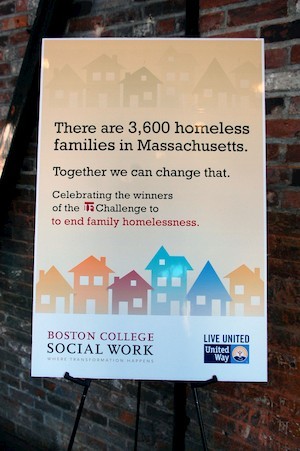
The IF Partnership leadership from both organizations.
What IF we could get closer to ending family homelessness in the state of Massachusetts? An inaugural competition sponsored by the United Way of Massachusetts Bay and Merrimack Valley (UWMB) and the Boston College School of Social Work (BCSSW) has engaged three area organizations to attempt to do just this.
This past week, in a ceremony held at the Coppersmith Restaurant in South Boston, this unique collaboration between BCSSW and the UWMB, called the IF Partnership, presented awards to HomeStart, Children’s HealthWatch, and the Metropolitan Boston Housing Partnership to identify innovative, cost-effective, and feasible ideas to reduce family homelessness in the state. The winning teams receive a mix of cash prize funding, technological assistance, as well as project evaluation from BCSSW’s Center for Social Innovation (CSI).

Professors Tiziana Dearing and Stephanie Berzin are the co-directors of BCSSW’s Center for Social Innovation.
“Our goal with the IF Challenge was to surface innovative, research-backed and feasible ideas that can be taken to a larger scale,” says Michael K. Durkin, President at UWMB. “Homelessness does not always begin, or look, the way most people think it does; it is often caused by a combination of complex factors. Tackling it is not something that a single organization can do alone. We’re proud to partner with Boston College and the winning organizations to help change the landscape of family homelessness in Massachusetts.”
“The IF Challenge winners represent bold, innovative ideas to end family homelessness,” says Stephanie Berzin, Co-Director of the CSI. “These projects have the potential to fundamentally shift how we respond to this critical issue and we look forward to working collaboratively with these organizations.”

Representatives from the three winning organizations attended a prize breakfast in South Boston.
Here’s more on what each of the organizations hope to accomplish with their award:
HomeStart: HomeStart has been working with Boston area property owners and tenants to help prevent eviction in the city since 2003. The organization currently runs a successful eviction prevention program in partnership with the Boston Housing Authority (BHA); through this partnership, HomeStart has shown the considerable costs associated with eviction to property owners – about $10,000 per tenant in Boston, and how interventions that keep tenants in their homes (about $2,000 per tenant with HomeStart) are actually a preferable option to both private and public property owners alike.
Thanks to $20,000 and expert support and perspective awarded through the IF Challenge, HomeStart will seek to replicate their existing model, and then make it scalable for larger organizations that affect bigger populations of those who may not be housing secure, such as municipal housing authorities.
“As a human services nonprofit, we don’t often have the time and resources to think about technology very often,” says Kelly Mulligan, Chief Program Officer at HomeStart. “We’re excited that the IF Challenge has provided us with the opportunity to do just this.”

The IF Challenge winners were: HomeStart, Children’s HealthWatch, and the MBHP.
Children’s HealthWatch at Boston Medical Center: Over the past couple of years, Children’s HealthWatch has begun to research if and how an increased Massachusetts Earned Income Tax Credit (EITC) could be used as a strategy to improve housing stability and child health and development.
EITC’s are credits designed to support low-income working individuals and families,; research has shown their ability to improve health, increase educational attainment, and even increase household earnings over time. However, EITC’s are not designed specifically to support housing stability; Children’s HealthWatch plans to use their $15,000 from the IF Challenge to determine if they could be designed as such; in short, they will examine the question: Could payments vary according to regional costs of living? It’s an idea inspired by various research studies, explains Justin Pasquariello, Executive Director of Children’s HealthWatch. With the guidance of the Center for Social Innovation, Children’s HealthWatch will launch the first phase, including outreach to leading thinkers in the field who have the data to support the work and who can build of coalitions with the muscle to influence policy.
Metropolitan Boston Housing Partnership (MBHP): A special technology award was given to the Metropolitan Boston Housing Partnership to develop an app for smart phones to easily connect families to critical resources already available on the MBHP website and in the office. According to Steven Farrell, Director of Communications, Development, and Policy at the MBHP, in some communities up to 95 percent of low income families have access to smart phones; this reality makes the creation of an app a fast, convenient, customer service-oriented and family-friendly way to provide access to information to as many low-income families in Boston as possible.
Thanks to $20,000 from the IF Challenge provided in a mix of funding, hardware and technological consulting, MBHP’s app will help families self- assess their eligibility for programs, while connecting them to affordable housing resources, including registration for MBHP workshops, apartment listings for homes families can afford, local and regional contacts, and other non-financial solutions.
Innovating with Families, or IF, is a partnership between the United Way and the Boston College School of Social Work designed to shape new relationships between social scientists and practitioners, towards finding innovative solutions to Greater Boston’s most pressing social problems.

